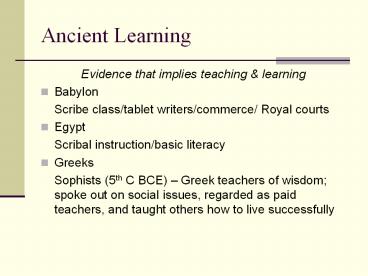Ancient Learning - PowerPoint PPT Presentation
Title:
Ancient Learning
Description:
Ancient Learning Evidence that implies teaching & learning Babylon Scribe class/tablet writers/commerce/ Royal courts Egypt Scribal instruction/basic literacy – PowerPoint PPT presentation
Number of Views:60
Avg rating:3.0/5.0
Title: Ancient Learning
1
Ancient Learning
- Evidence that implies teaching learning
- Babylon
- Scribe class/tablet writers/commerce/ Royal
courts - Egypt
- Scribal instruction/basic literacy
- Greeks
- Sophists (5th C BCE) Greek teachers of wisdom
spoke out on social issues, regarded as paid
teachers, and taught others how to live
successfully
2
Ancient Learning
- The Greats
- Socrates (469399 BCE)
- Dialectic to define essence of anything
- Instruction does not require buildingsmarketplac
e. Plato created an academy outside of Athens
(335 BCE 529 AD) - Plato studied w/Socrates and Aristotle studied
w/Plato. - Additional schools of philosophy in Greece
- Alexandria Museum, 300 BCE
- Collecting place for manuscripts, attracts
scholars, research center, library holding
120,000 single books - Similar Centers
- Mark Anthony, Julius Caesar, Asia Minor
3
Ancient Learning
- Learning supported by Royal Court w/o much
interference - Christian Rome replaces Greek as center of
learning - Emergence of licensing of schools, allocation of
space for schools - 8th C AD Church controls education to Dark Ages
- 11th C Europe begins to emerge from Dark Ages
- Trade, commerce, formation of guilds
- Pope Gregory VII supports cathedral schools to
educate clergy
4
Ancient Learning
- Women in Education
- Education reserved for males
- Some mention of learned nuns and women teachers
of the young - Apostle Paul stated A woman must be a learner,
listening quietly and with due submission. But I
suffer not a woman to be a teacher, nor should a
woman be allowed to usurp a mans authority, but
must remain silent.
5
Ancient Learning
- Women in Education cont.
- Aristotle woman was defective male ?
- Role Marriage and children or convent
- Some exceptions Dorotea Bocci 1390
philosophy/Bologna
6
Ancient Learning
- Early Medieval (7th -12th C in Europe)
- Obstacles to Education
- Church main educator
- Universities suppose to search for Classical and
Christian thought - Political situation
- Lack of interest
- Thought of as Vocational Institutions
- Open Access
- Lack of physical equipment
7
Ancient Learning
- Pre-1500 era
- Universities provided little social status
- 11th and 12 centuries
- Universities went from Monasteries to Cathedral
schools - Academic Life Theology Law (Canon)
- Subjects taught The Seven Liberal Arts
- Trivium grammar, rhetoric, and dialect
- Quadtrivium arithmetic, geometry, astronomy,
music - 12th C. Philosophy included
8
Ancient Learning
- 12th Century Europe
- 4 Stages in the Development of the Medieval
University - Written laws 1210 Paris reference to a written
document - Right to be sued 1212 University of Paris sued
in Papal Court by local religious authority - Official seal proof of existence of funds to
pay debts (Dartmouth case) - Approval to collect money and engage in
transactions 1215 Pope gives Univ. of Paris
authority to make its own rules etc.
9
Ancient Learning
- Chancellor
- Paris had restrictive authority
- England Broaden authority (spiritual, civil,
criminal jurisdiction) - Students
- Teachers
- Townspeople
- University/Town relationship
- Murder
- Tavern Fights
- Hostile Mayors
10
Ancient Learning
- Prerequisites for becoming a student
- Latin, read, write, speak, typical age 14
course of study 5 years - Letter of Recommendation
- Poor Scholars
11
Ancient Learning
- Student schedule-Bologna 1517
- Rise 4 am
- Arts Lecture 5 am
- Mass Breakfast 6 am
- Classes 8 to 10 am
- Formal debates before noon meal
- Repetitions (questions about lectures)
- Lectures 3to 5 pm
- Disputations (explanation of a statement or
theory) 5 to 6 pm - Repetitions after evening meal (beer was
common) - Bed 9 pm
- Fines (gambling, handball, swordplay, animals,
prostitution) - Only Latin spoken in the Halls
- No weapons
- Punishment deprivation of commons or meals
(Flogging?)
12
Ancient Learning
- Course of Study
- Baccalaureate
- 5 years
- Determination exam given by a faculty member
and open to the public during lent - Masters
- Additional study
- Proscribed readings/disputations/permission to
teach, pass an exam - PhD
- 1366 theology
- 16 years beyond masters
- 35 years old
13
Ancient Learning
- Oxford Cambridge
- The roots of US Higher Education
- Oxford
- Full university towards the close of the 12th C
- Specialized Arts, civil and canon law,
theology, medicine (added 13th C) - Cambridge
- Specialized Arts, canon law, theology, civil
law, medicine (later time) - 14th C students at least 14 years, average age
15-17, undergraduate curriculum-classical

























![⚡Read✔[PDF] The Shamanic Way of the Bee: Ancient Wisdom and Healing Practices of the Bee PowerPoint PPT Presentation](https://s3.amazonaws.com/images.powershow.com/10051482.th0.jpg?_=20240610128)





